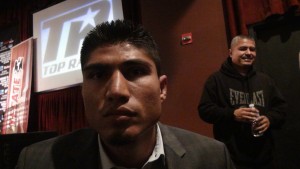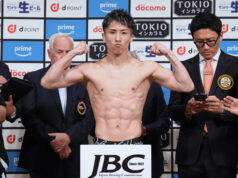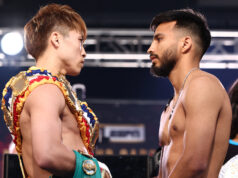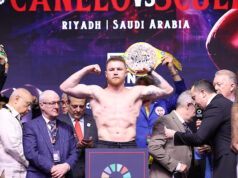By Jimmy Tobin-

Saturday night, at the MGM Grand in Las Vegas, lightweight, Mikey Garcia, participated in his first significant fight in three years, facing Montenegrin sparkplug, Dejan Zlaticanin. Having positioned himself to ladle a helping from the Waddell and Reed pot, Garcia returned finally to the only vocation that was ever going to provide him the lifestyle he desired. And, as he had before he left, Garcia looked masterful, dispatching Zlaticanin with a violence and efficiency that reminded witnesses what Garcia is capable of and what frightening consequences prizefighters tempt.
Boxers who forfeit a portion of their primes to out-of-the-ring considerations face a unique peril upon return: their sport does not pass them by so much as it lies in wait. Provided it is against an opponent of some merit, returning to the ring after a prolonged absence brings very real concerns. For Garcia, those concerns regarded not only ring rust—which he may not have shed entirely in an underwhelming tune up last July—but also issues of style. When offensively ablaze, Zlaticanin employs a volume that breaks icy opponents. But while the pressure fighter may be the boxer’s theoretical kryptonite, the abyss in class between Garcia and Zlaticanin, an abyss that figured immediately, made such abstractions moot.
It was, in many ways, a typical Garcia performance. With the opening bell, Zlaticanin entered into a fight not only with an opponent who could—and would—leave him senseless, but with his own frustration. The question for Zlaticanin was whether he could refrain from making mistakes against an opponent who invites them. And if Zlaticanin could not, could he at least survive those mistakes once made.
The third round brought answers. At a loss for how to kickstart his offense, Zlaticanin, chin extended over his front foot, lunged a desperate cross at Garcia, and suffered the uppercut Garcia had been waiting to whip. Spun from the blow, Zlaticanin teetered woozily into a right hook so vicious it not only sealed the win for Garcia but put his victory celebration on hold.
As he has throughout his career, Garcia forced an opponent to make a mistake—and then ruined him for it. Perhaps forced is the wrong word, though, because what Garcia really does is ensnare you in a battle of wills, demanding you choose between losing a dull decision and risking a strategy more likely to see you victimized than victorious.
He is then, anything but the typical Mexican fighter: if there is any of the attritionist’s mentality in him he has yet to show it. Indeed, Garcia is so measured in his approach that he can even bore; his fights are more impressive than exciting. That tempered violence could be a product of Garcia being trained by his brother Robert (a former fighter), and the fraternal concerns such a partnership might entail. Garcia’s wiring is likely another factor, as is the fact that he was born and raised in the US, away from the psychology of Mexico proper.
But were his last name Williams, were he born in Baltimore instead of Oxnard, into a fan base dwindling instead of eternal, one wonders how Garcia would be perceived. What would Garcia’s people say about his win over Orlando Salido, where, his nose broken by a headbutt, Garcia opted to take the win the foul afforded him rather than confirm his machismo? How would they judge Garcia’s refusal to accept a catchweight against the ghost of Juan Manuel Lopez, only to come in overweight himself, gaining an unfair advantage against an opponent who was getting sparked regardless? There are even examples of Mexican fighters with styles similar to Garcia struggling to capture the hearts of their people. Consider the cooler welcome that met a young Juan Manuel Marquez, how appreciation of him lagged behind that of countrymen Erik Morales and Marco Antonio Barrera until Marquez became less perfect, more aggressive, until he had to defend the pride of a country from a rampaging nemesis.
Garcia has suffered little criticism for his conduct, he knows none of Marquez’ early troubles, and yet the hope is that things stop going so smoothly for him. There is little intrigue in yet another supremely talented fighter—and Garcia is most certainly that—merely reaffirming the obvious twice a year. The destruction of Zlaticanin proved that Garcia remains the nightmare proposition he was before his self-imposed hiatus. No one at lightweight is fighter enough to solve Garcia, and he is unlikely to find much trouble among the premier boxing champions at junior welterweight either. And if that is being naive, better to be so in support of Garcia than in support of those men with the opportunity but not the chance to beat him.
So how good is Garcia? And do he and his team care to answer that question? Because the fighter to pose it is out there. You know who he is, as do the Garcia’s. The Garcia’s also know, as anyone who follows the sport does, just how well-insulated the family’s fighting pride is from this threat. (What is less clear, though far more interesting, is whether that awareness figured at all in the departure from Top Rank).
Of course, the obvious fight to make for Garcia is likely to one day number among the casualties of boxing’s fractured landscape. But should he ever get the itch to really prove himself, he will to do so with Oxnard and Omaha in the stands.











